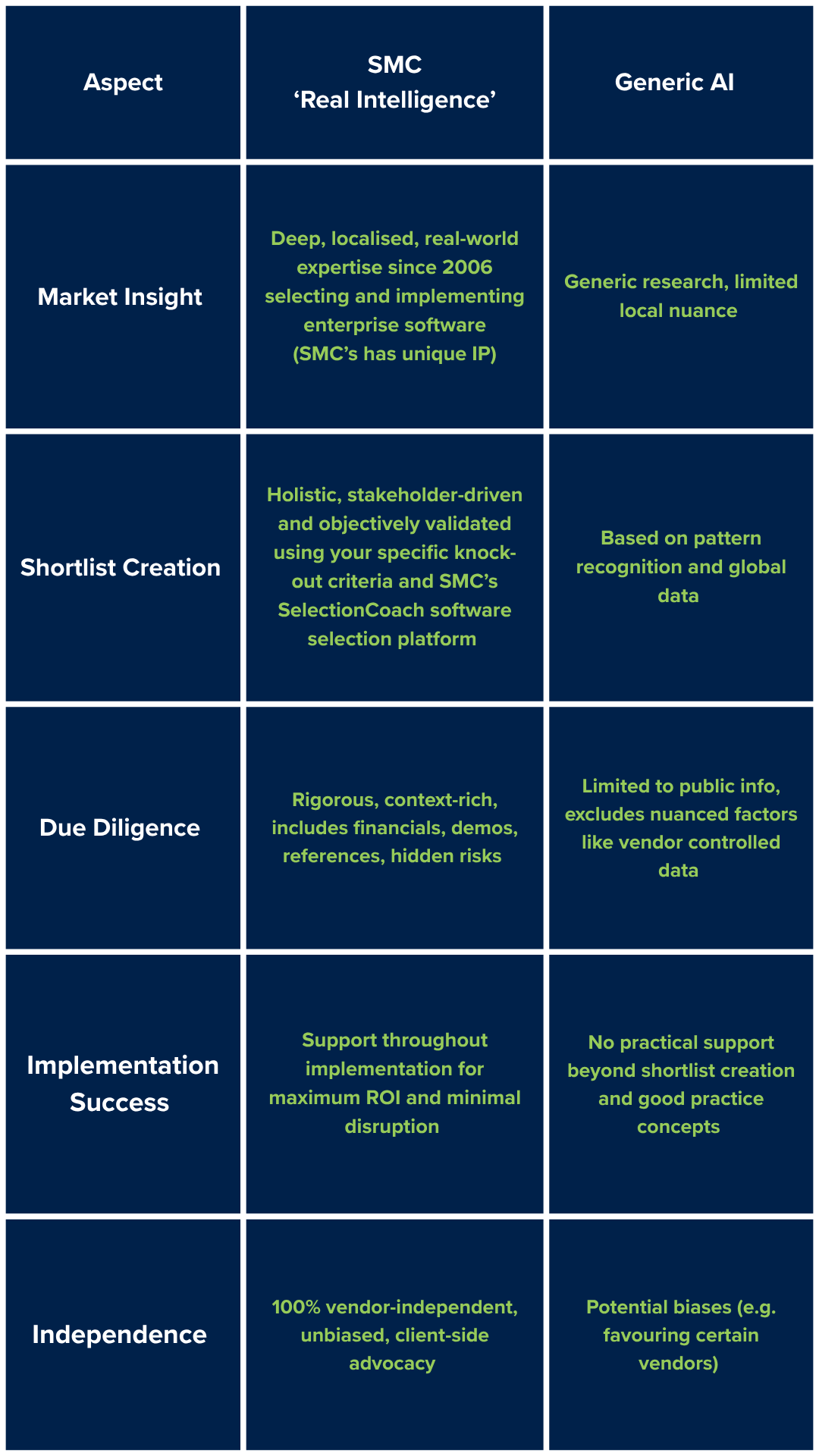For 20 years, Solution Minds Consulting (SMC) has helped Australian organisations choose and implement enterprise software that actually delivers on its promises. We’re well and truly into the AI era now, and while it’s reshaped how organisations approach software purchasing decisions, it hasn’t changed the core challenge.
Some companies are turning to AI tools to help shortlist vendors, define requirements, or surface options early on. And while these tools are impressive, they miss the question every organisation eventually asks:
“Who can I trust to guide me to the right vendor and partner that will actually deliver the outcomes we need?”
AI can generate a list. But it can’t tell you which vendors are best for your specific knock-out criteria and strategic objectives. It can’t flag the implementation partners who consistently overpromise. It can’t understand the culture, constraints, or politics inside your organisation – or why previous projects struggled.
That gap between accessible information and real-world decision-making is where many organisations are getting caught.
Comparing SMC Expertise with AI

The Limitations of AI-Driven Selection
AI tools such as ChatGPT, Perplexity, or Gemini can rapidly generate software shortlists – but they cannot evaluate vendor reliability, anticipate implementation challenges, or interpret the complex realities of specific industries. AI doesn’t perform reference checks, negotiate contracts, or ensure a solution is successfully deployed. These are precisely the areas where Solution Minds Consulting excels – applying two decades of practical experience, negotiation expertise, and ongoing client partnership. Moreover, AI-generated insights can be incomplete, biased, or disconnected from the local context. They often overlook crucial factors such as Australian regulatory requirements, market dynamics, and the human and cultural nuances that shape successful transformation outcomes.
Why Real Intelligence Wins
Relying solely on AI to select an ERP or enterprise platform is a shortcut that risks costly misalignment, scope creep, or project failure. SMC’s Real Intelligence bridges the gap between data and judgment – combining independent, experience-driven advice with a structured, evidence-based process. Clients move from an informed shortlist to a deeply vetted preferred vendor, then through to an implementation that delivers measurable business value – not theoretical potential.
The Takeaway
To unlock the full return on your enterprise software investment, partner with experts who know the Australian market inside-out – professionals who understand your goals, speak your language, and stay with you from strategy through delivery. That’s the competitive edge only Real Intelligence provides.
With over 750 transformational projects since 2006, SMC brings unmatched local expertise, independent governance, and proven methodology to every engagement – from strategy to vendor selection to implementation success.
FAQ
What can AI tools do in software selection?
AI tools can scan public information, summarise vendor descriptions, and generate broad comparison lists. They are useful for early exploration and understanding general market options.
What can AI not do in this process?
AI cannot assess vendor delivery history, interpret internal context, or evaluate partner capability. It also cannot validate requirements, perform reference checks, or review implementation risks.
Why do AI generated shortlists vary?
AI models draw from a mix of public data and training sources. Results differ based on model behaviour, prompt structure, and information gaps. This can lead to inconsistent shortlists or outdated suggestions.
Is AI reliable for ranking vendors?
Not entirely. AI does not have access to live performance data, partner capacity, regional nuances, or industry specific constraints. Rankings are often generated without evidence.
Does AI understand Australian compliance requirements?
Only at a high level. AI tools can reference general standards, but they do not consistently differentiate local regulations, sector frameworks, or state based requirements.
Can AI understand internal culture or project history?
No. AI cannot interpret organisational dynamics, legacy issues, or political context that influence software decisions and implementation outcomes.
How should organisations use AI in software research?
Use AI to gather information, surface questions, and speed up discovery. Use human expertise for validation, context, risk assessment, and final decisions.
What are the risks of relying only on AI for software selection?
Common risks include misalignment with business goals, choosing vendors or partners that cannot deliver, overlooking integration challenges, and underestimating change impacts.
Why do AI tools sometimes provide inaccurate vendor information?
Because they rely on patterns, not verified data. They may mix product lines, merge vendor names, reference outdated information, or create incorrect assumptions.
Where can I learn more about comparing software options?
You can browse independent comparisons and solution overviews on the SMC Guides page.

